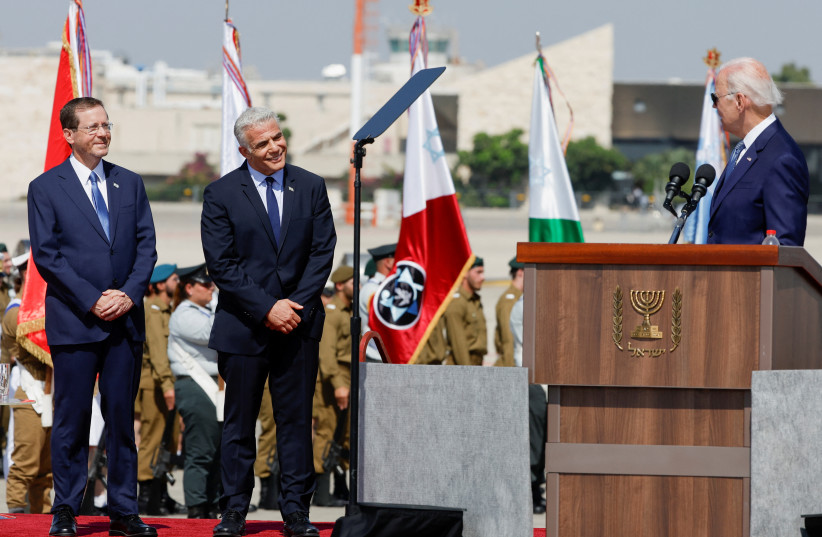The International Atomic Energy Agency’s deadline for Iran to fully restore its nuclear inspectors’ surveillance cameras or risk causing a “fatal blow” to the JCPOA 2015 nuclear deal passed on July 8.
France is now threatening its own deadline of early August for the Islamic Republic to return to the nuclear deal.
Israel has been campaigning for a deadline and punishing Plan B if Tehran violates the deadline.
Yet, all signs are that the visit of US President Joe Biden to Israel will bring no deadline and no specific commitment to snapback sanctions on the ayatollahs.
The US on the Iran deal

In a lead-up to the trip, US National Security Advisor Jake Sullivan said, “We’ve reunited our partners to ensure that it’s Iran, not the United States that is isolated until it returns to the nuclear deal. And the frequency of Iranian-sponsored attacks against our forces in Iraq and Syria has dropped dramatically.”
So, the strategy is isolation, but no real specifics about how and when that will get Iran Supreme Leader Ayatollah Ali Khamenei to back down from the nuclear threshold on which he is already basically standing.
Revealingly, Sullivan’s other main point was that Iranian-sponsored attacks on US forces in Iraq and Syria are down, which was not difficult since most of them have been pulled out.
Questioned about a deadline, he responded, “We have not marked a date on the calendar. We have indicated that we believe there is a deal on the table. It is a deal that we’re backing – that our European partners are backing – that is available to Iran.”
So no deadline, no mention of a referral to the UN Security Council and no snapback threat. This means the IAEA and France are now clearly tougher and more specific about being tough than the US.
What's the next move?
Sullivan continued, “If they don’t, we’re not standing still. Even as we speak, we’ve already introduced two rounds of sanctions to crack down on their effort to evade the existing sanctions regime. We are curbing their ability to smuggle oil, for example, through the Quds Force and other entities within Iran.
“And we’ll keep doing that,” he said, and referenced “increasing pressure” and the vote against Iran by the IAEA on June 8.
While it’s true that the Biden administration recently issued new sanctions on Khamenei’s precious Quds Force affiliates, it also outed Iran for helping Russia fight against Ukraine.
However, the new sanctions have zero chance of moving the dial on Iranian behavior beyond the existing sanctions.
At most, they send a very mild message that Biden does not intend to grant new concessions to reach a deal with Iran.
So what is the US plan for preventing Iran from crossing the nuclear threshold or from using the current extended period to conceal enough of its 60% enriched uranium for multiple nuclear bombs at a later date?
Put differently: What is to stop Iran from agreeing to a return to the JCPOA in another month or two and claiming it is ready to give up all of its enriched uranium back to the 2015 nuclear limits, while in reality it will only give up some and has hidden significant quantities while the IAEA was blind?
This was exactly what the IAEA warned about on June 9.
If the Biden strategy was to block this scenario, his visit to Israel could be used to announce a UN Security Council referral and a deadline, like France suggested, of a few weeks. If Iran violated the deadline, full global snapback sanctions could be invoked. That would be teeth.
Instead, it appears that Washington is months if not more away from making any concrete deadlines or threats.
Its real strategy right now seems to be to tolerate Iran continuing to enrich uranium to 60% for more potential bombs – as well as tolerate the IAEA’s partial blindness – with the hope that Khamenei refrains from publicly jumping to 90% weaponized enrichment and kicking the IAEA from the country entirely.
